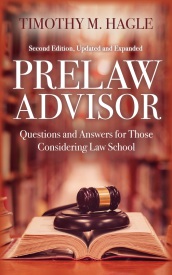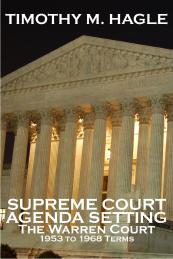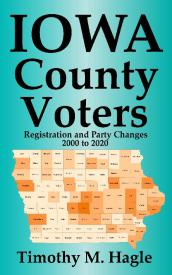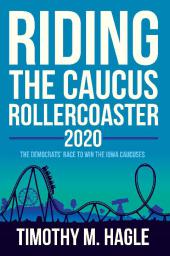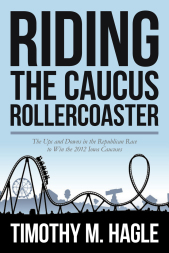
Contact Info
347 Schaeffer Hall
319-335-2348
timothy-hagle@uiowa.edu
Twitter: @ProfHagle
Fall 2024 Office Hours
Tue & Th: 4:45-6:15
Mailing Address
Dept of Political Science
341 Schaeffer Hall
20 E. Washington Street
The University of Iowa
Iowa City, Iowa 52242
News
Posted updated Prelaw FAQ for UI students
New Book, Riding the Caucus Rollercoaster 2024, published in paperback and for Kindle devices.
Posted updates to 12 papers in Iowa Voting Series for 2022 election data
New Book, Supreme Court Agenda Setting: The Warren Court, published for Kindle devices and computers with Kindle reader.
Published updated and expanded edition of Prelaw Advisor in paperback and for Kindle readers
My books
POLI:3120/30:158 The Criminal Justice System
Miscellaneous Teaching Evaluations
This page contains comments I have received from former students (usually via email). More recent comments are at the top. Any comments by me are in italics following the comment.
- Professor Hagle,
I took four of your courses in my last year at Iowa, and they were invaluable for my law school career. Within the first week of starting here at ______ Law School, I realized just how much of an edge your courses gave me over my peers. Really, it was apparent from one of the first days of orientation when we read Fraser and I got to show off a little by remembering some of the speech.
Moreover, at the beginning of the year, when the learning curve is most steep, I did not have to waste time learning the names of reporters or, and this was a huge advantage, learning how to read/brief a case. Thanks to your introduction to the Socratic method, I was not scared to be called on in class. I was able to respond under pressure and stay engaged with the discussion. Thanks in no small part to the knowledge gained from Research in Judicial Politics, I got my first law school A today (in Legal Research). Hopefully there is more to come. Additionally, my experience writing papers for your courses helped greatly with my Legal Writing class (A's on the first two papers, still waiting for the final). Finally, next semester I will be in Constitutional Law, and I know my experience in your class will come in handy.
As an aside, I am taking the GMAT tomorrow so I can pursue a JD/MBA joint degree. You should consider adding this test to your list of reasons to study math.
In sum, I just wanted to write this (I have been meaning to do this sooner) to tell you how grateful I am to have taken your courses and for the preparation they gave me for law school. I hope your school-year is going well!
This was from a student starting his second semester of law school. As he notes, he was in four courses of mine so I'm posting this for all four.
-
Dear Professor Hagle,
How is life at Iowa? I hope you are doing well! I just wanted to update you on my progress through law school. First semester was a grueling experience. When people say "law school is tough", you really don't know until you're there. It has been one of the most intellectually stimulating experiences of my life. I managed to stay afloat of the work load, and at the end, Constitutional Law was my best grade! imagine that? I really think taking your course helped a lot! It just seemed to click much easier than the other classes even though the approach to the law was nothing like undergrad.
Anyways, this summer I will be interning with the New York State Attorney General, Civil Rights Bureau in Manhattan. I am really excited about that opportunity. I thank you for the support and how tough you were on us in con law, it helps in the end. (I am taking criminal law this semester, and taking your criminal justice system course is coming in handy too. We are studying felony murder right now).
Please continue to be tough on your students. It is in their best interest to learn how to work hard now because the learning curve in law school is very high and working hard is the only way to break the curve.
Take care.
-
Hi Professor Hagle,
Just another quick note from law school. We are spending a whole class today in my legal writing class talking about basic case citations. Even a semester into law school, people don't know what "P.2d" means in a citation. Luckily I was not among them. I know I've sent a few e-mails in the past thanking you for prepping me for law school, but I'm not sure I told you how much I appreciate the "little things" that I learned in your class. Being familiar with terms, citations, etc. from the beginning of law school has helped a tremendous amount. And a note to pass on to students: As I sit here in legal writing, I can "take the day off" because we're going over things I learned in undergrad. There are great benefits from taking your classes, in addition to the material we learned.
Thanks again!
This was another note from the student who had sent the long one below. I'll also post this one in a couple of places.
-
Hi Professor Hagle,
I wrote to you during my first week of the semester and told you how your classes had given me a great head start in law school. After finishing the semester, I can honestly say that "Thank You" doesn't go far enough to show my appreciation for the things you do for future law students.
In my writing class, I felt (and the professor indicated) that my writing was right where it needed to be. More specifically, I was writing in concise terms and saying exactly what I needed to say without going any further. There were times in your classes where I thought, "Okay he's going a little overboard here" when you would talk to us about writing. I couldn't have been more wrong. If my professor wanted five pages, he wanted five pages loaded with material, and no fluff whatsoever. Exactly how you said it would be, of course!
Another part of the writing course (and other courses) that I thought you gave me a leg up in has to do with the length requirement. In my writing course, I could have written 15-20 good pages on each paper. Our papers were limited to 10 pages. In another course, our essay exam was subject to a strict length requirement. Talk about pressure! I spotted 5 issues on the exam that I couldn't even mention on the exam because of this length requirement. I know you take a bit of grief for your "10 pages maximum", no page range, etc. Once again, it's spot on with how law school is, and this was great preparation.
Although I never used the "drop first test score" option in your class, basing the majority of a student's grade on one exam is exactly how it is in law school. For my other three classes (besides writing), our entire grade was based on one three-hour exam per class. So, having an exam worth 70% of the grade really isn't that bad!
The next comment I have is in regards to feedback in your courses. I was one who strongly objected (although not to you) to the fact that you did not give a "class average" or any idea of how others in the class did on tests. Also, I did not like that you waited until the last day of the course to return papers. In the research class, I did not like that we had no certain grade, but only an idea of our progress. But, in my first semester of law school, I got absolutely NO feedback on how I was doing in the course, except for my first paper grade in my writing course. This is a very unsettling feeling, and although you do give some grades throughout the semester, your courses were the closest I came to this feeling during undergrad. In my opinion, the lack of feedback throughout the semester is by far the most difficult part of law school. Trying to gauge how you're doing in the course is impossible, and it can drive you crazy at times.
Here's one that your course does NOT do well. In all of my courses, we had set assignments each day! Okay, so maybe I'm still slightly bitter that on the day I was assigned to speak in Con Law I prepared 4 or 5 extra cases. But, I just had to throw that in there!
The last comment is much more general. The reading, the writing, the classroom atmosphere, etc. that you provide are great preparation for law school. Attention to detail is key, taking good notes is key, and being prepared for class on a daily basis is crucial. The reading is dense, I had to read things many times to understand it, and there is a ton of reading every night. Professors don't use powerpoint in law school, so taking notes without powerpoint is a great skill to learn.
Okay one more comment, sorry! I had some multiple choice tests during finals. I would say your exams were very representative of what I saw in law school. I'm sure every student dislikes the fact that your exams are very detail oriented, and that one word can completely change the answer. Well, if they're going to law school, they should get used to it.
Sorry for the lengthy e-mail, but I really felt that I needed to tell you how much of an advantage I felt that I had in my first semester of law school because of your classes. I enjoyed your classes a lot, and I appreciated your teaching style at the time. But, now more than ever, I feel lucky to have had a professor who is so committed to preparing students for law school. Thank you so much, happy holidays!This student sent me some prior comments when he started his first semester of law school. These apply to several of the courses he took with me as an undergrad that I'm going to post them to the comments for each course.
- I really enjoyed your class. You are an exceptional teacher--one of the best I have had during my college career so far! Just thought you might like to know.
The first time through a new course can be a little rough, as I thought this one was, so I'm very happy that this student thought I did a good job.
- This comment is actually an exchange I had with a student about the paper assignment for the course. This exchange is a bit lengthy, but contains some important points. His
initial comments are followed by my response (in italics), his reply, and some additional comments by me (also in italics).
I have a suggestion for future courses. If you are going to give the same type of paper assignment (which I thought was very effective), either eliminate the upper page limit or shorten the factual situation. As you yourself said, it would be almost impossible to thoroughly cover all of the possible offenses in ten pages, yet this is what the assignment asked us to do.
I started out with an eighteen page paper in which I did a thorough analysis of all of the possible offenses (and answered many of the questions you mentioned in the margins), yet I had to spend a majority of my time cutting out large sections to get it under the page limit. I was left with a paper that I was not at all satisfied with to turn in. I felt I was only able to give a superficial analysis in the space I was allowed instead of the more thorough analysis I would have liked.
I have heard the rationale that page limits teach students to write in a streamlined fashion and cut out wordiness, but I do not buy that. If a longer paper is too wordy, just count off. If a longer paper is good (that is possible), then the student learns more by writing a longer paper with a more thorough analysis.
I realized that this doesn't seem like a big deal, but it's a frustration I've encountered repeatedly in the poli sci department (the philo depart. is better about this). Anyways, I usually get extremely frustrated by such restrictive limits (yours have been some of the best and most flexible--another class required an analysis of a 500 page book in 3-4 pages).
Just thought I would provide some feedback since you have always mentioned you like to hear what students would do to improve courses. Thanks.
Thanks for the feedback. I've tended to like to write long pieces, so I understand your frustration. As you are aware, paper limits have both practical and pedagogical justifications. The former isn't too great a concern because not that many folks will write that much. On the other hand, one of the things they told me in law school was that if you are given an N page limit, make sure you write, N pages; anything less is wasted argument space.
On the pedagogical side, a page limit does help to get folks to cut wordiness from papers. More important, however, is that it forces one to focus the paper and not get lost in tangential issues. Even if you don't buy that, the plain fact is that there will be times when you have to face such limits. Let me give you three examples. (I'll bet you just knew I was going to tell you stories about this!) You may recall the Veralone v. Kratt brief I had folks read for 30:116. That was the product of my first year legal writing course. We had *a lot* more than three pages of facts to work with and had a 15-page limit. The instructor told us that page limits are often set for such things, though, like you, I wasn't so sure. For the first draft of the thing, one of the students wrote a 40-page paper. I didn't read it, but I'm sure he thoroughly covered every possible angle. Even so, he had to cut it down for the final draft.
The second story concerns a publication I had in one of the top Political Science journals. After a couple sets of revisions the editor finally accepted the article, but told me the final draft had to be cut from about 50 pages to about 25. Like you, I was not happy about it and I felt the finished product was good, but not the best simply because it left so much out. I will grant, however, that it was certainly more focused.
Finally, consider making arguments before an appellate court, particularly the Supreme Court. You are given a strict time limit, which includes any time spent answering direct questions from the justices. You have to prepare for a 30 or 60 minute presentation, but when their questions start eating into your time you have to be ready to make drastic cuts on the spot to fit into your allotted time. I had to do this when I argued the Veralone v. Kratt brief before a mock court. Like a page limit, when the red light comes on you stop. Period.
So, as you've no doubt gathered by now, although I'm sympathetic to the issue, having a reasonable page limit is good practice for when you face them elsewhere. (The key, I suppose, being its reasonableness.)
I agree with the reasonable "limit." However, I think on the assignment you gave a more reasonable limit or suggested guide might have been in the 10-15 page range. This also might have motivated those students who wrote two and three page papers to put a bit more effort into their work. I realize 10-15 scares a lot of students, but it's my understanding that many people in our class do have the intention of going to law school. I might be off base, but if someone cannot write a ten to fifteen page paper as an undergraduate in two or three weeks, they might have a lot of trouble in law school.
As I said before, your guidelines are more reasonable than most I have encountered in the department, but I do think this one was a bit too restrictive considering the facts of the situation.
That said, I really appreciated the assignment because it was one that truly tested one's knowledge of the material and forced one to think about how offenses related to one another and were practically applied. It was one of the more enjoyable paper assignments I have had in the poli sci department (better than those book reports in my other classes).
The assignment, by the way, was for the students to analyze a two-page factual situation based on the crimes we discussed in the first half of the course. This student is correct that more than half of the students expressed an interest in law school and should not be afraid of a longer paper. Even so, I'm not sure that my setting a higher upper limit would cause them to write more; as it was only a few filled the 10-page limit. From my perspective, if I set a higher limit I might expect a better analysis than I do for a 10-page paper. As I told this student in my first reply, for students eager to push the limit the assignment becomes one of learning to focus on the essentials of the topic.
A few weeks after he started law school at Yale he sent me another message that contained the following.
I shouldn't complain about your page limits. Our first big writing assignment was a "canned" memo with a maximum of five pages. The "can" was about 175 pages of documents. Margins, font size, and font style were all required. Needless to say, i wasn't happy. I just had lunch with the professor today, though, so don't feel as if you are the only one I complain to about it.
Like I said, sometimes you do have to deal with strict page limits and other restrictions. In some circumstances it might just be tradition. In a classroom setting, part of the point is to get students to be more focused in their thinking and concise in their writing.
- I just wanted to drop you a line and say thanks for all of your great teaching I benefited from. I was sitting in my criminal law class . . . yesterday and my professor kept teaching things I
already know, thanks to you. And he even used a couple of the same examples you did. All of your classes have given me what I think is a huge advantage in my first year, and I wanted to say thank
you! (8/22/02)
This student had been in both 30:116 and 30:158
- Hello Professor Hagle,
How are you? Are you back at Iowa yet?
I am in my second year of law school now and I cannot wait for it to be done. I am taking criminal procedure this semester and once again, I have already read and learned some major principles from taking Criminal Procedure with you. I was wondering if you had a copy or a draft that you could email me of that chart you give to the constitutional law students with all the justices and their political affiliation. I kept mine but it is all worn out and I think it would be useful.This message from a former student came to me while I was still at DOJ.
